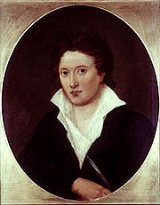
in the English language
. Shelley was famous for his association with John Keats
and Lord Byron. The novelist Mary Shelley
was his second wife.
He is most famous for such classic anthology
verse works as Ozymandias
, Ode to the West Wind
, To a Skylark
, Music, When Soft Voices Die, The Cloud
and The Masque of Anarchy
, which are among the most popular and critically acclaimed poems in the English language.
You would not easily guessAll the modes of distressWhich torture the tenants of earth;And the various evils,Which like so many devils,Attend the poor souls from their birth.![]()
Cease, cease, wayward Mortal! I dare not unveilThe shadows that float o’er Eternity’s vale;Nought waits for the good but a spirit of Love,That will hail their blest advent to regions above.For Love, Mortal, gleams through the gloom of my sway,And the shades which surround me fly fast at its ray.![]()
Dar’st thou amid the varied To live alone, an isolated thing?![]()
Not the swart Pariah in some Indian grove,Lone, lean, and hunted by his brother’s hate,Hath drunk so deep the cup of bitter fateAs that poor wretch who cannot, cannot love:He bears a load which nothing can remove,A killing, withering weight.![]()
Sweet the rose which lives in Heaven,Although on earth ’tis planted,Where its honours blow,While by earth’s slaves the leaves are rivenWhich die the while they glow.![]()
Age cannot Love destroy,But perfidy can blast the flower,Even when in most unwary hourIt blooms in Fancy’s bower.Age cannot Love destroy,But perfidy can rend the shrineIn which its vermeil splendours shine.![]()
Here I swear, and as I break my oath may Infinity Eternity blast me, here I swear that never will I forgive Christianity! It is the only point on which I allow myself to encourage revenge... Oh, how I wish I were the Antichrist, that it were mine to crush the Demon, to hurl him to his native Hell never to rise again — I expect to gratify some of this insatiable feeling in Poetry.![]()
I think that the leaf of a tree, the meanest insect on wh. we trample are in themselves arguments more conclusive than any which can be adduced that some vast intellect animates Infinity.![]()
GOVERNMENT has no rights; it is a delegation from several individuals for the purpose of securing their own. It is therefore just, only so far as it exists by their consent, useful only so far as it operates to their well-being.![]()
No man has a right to disturb the public peace, by personally resisting the execution of a law however bad. He ought to acquiesce, using at the same time the utmost powers of his reason, to promote its repeal.![]()

